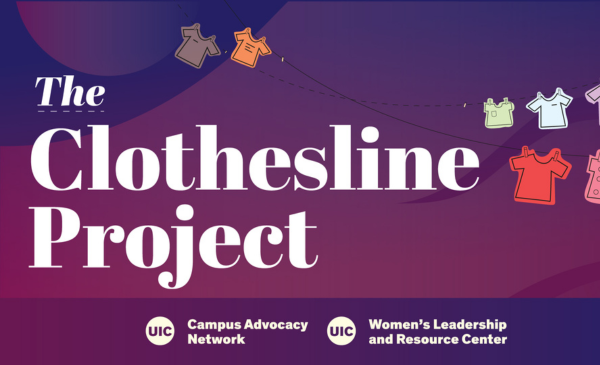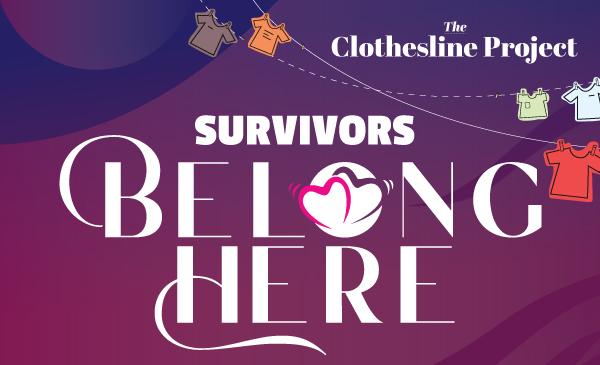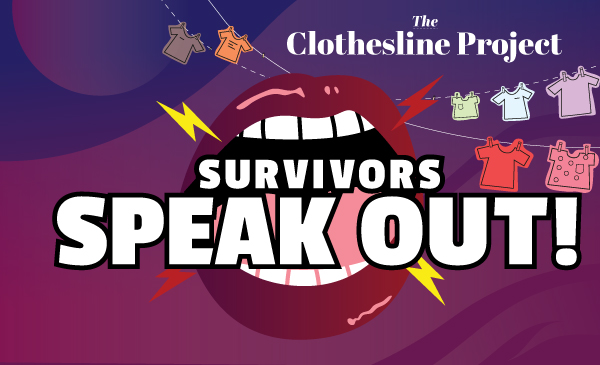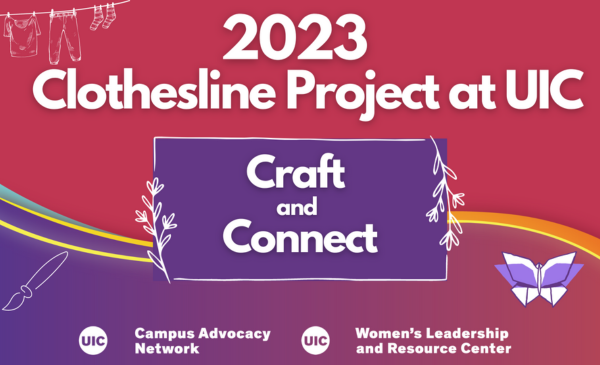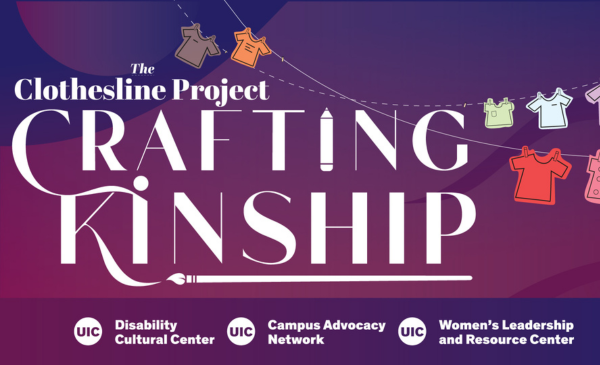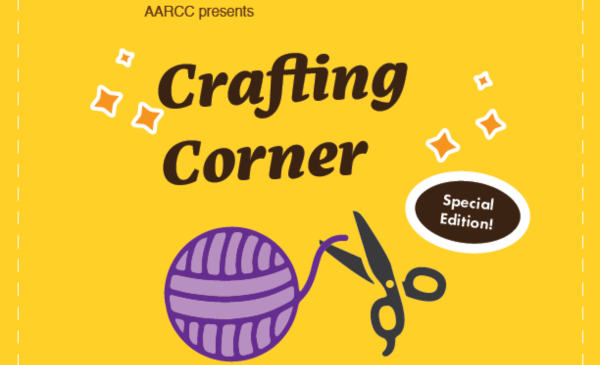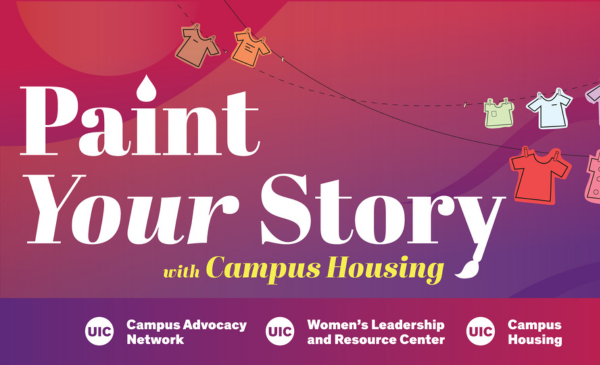The Clothesline Project
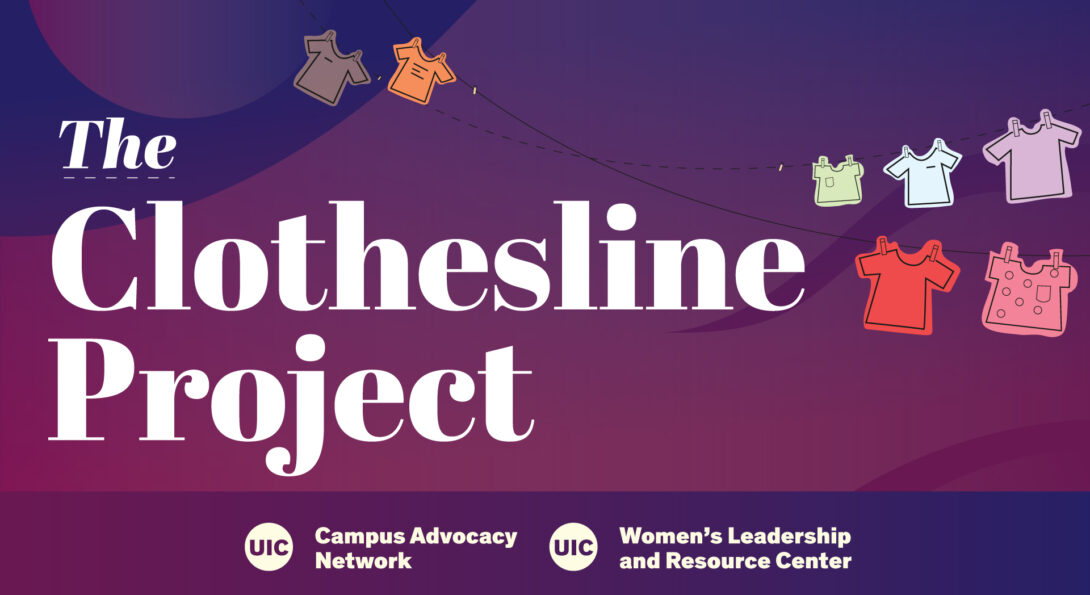
Intro
Throughout its 31-year history, the Women’s Leadership and Resource Center and Campus Advocacy Network’s programming in April has centered around Sexual Assault Awareness Month and engaged campus and community audiences in important conversations about gender-based violence. In 2023, we relaunched the Clothesline Project at UIC, hosting multiple opportunities across campus to share messages of resilience, healing, and hope for individuals and communities impacted by interpersonal violence and abuse.
Background
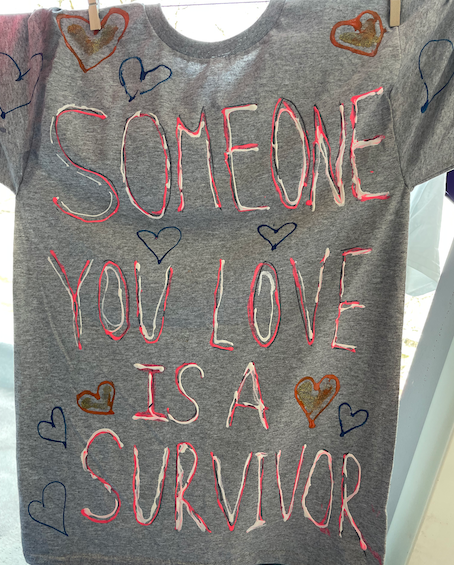
The Clothesline Project is an interactive exhibit of messages of resilience, healing, and hope for individuals and communities impacted by interpersonal violence and abuse. The initiative began in 1990 with a group of Massachusetts women who wanted to give survivors an opportunity to speak out about their experiences. Since then, college campuses, crisis centers, and community organizations throughout the U.S. and around the world have hosted Clothesline Project events to bear witness to violence against women.
From the original official Clothesline Project website:
“One of the women, visual artist Rachel Carey-Harper, moved by the power of the AIDS quilt, presented the concept of using shirts–hanging on a clothesline–as the vehicle for raising awareness about this issue. The idea of using a clothesline was a natural. Doing the laundry was always considered women’s work and in the days of close-knit neighborhoods women often exchanged information over backyard fences while hanging their clothes out to dry.”
“The concept was simple–let each woman tell her story in her own unique way, using words and/or artwork to decorate her shirt. Once finished, she would then hang her shirt on the clothesline. This very action serves many purposes. It acts as an educational tool for those who come to view the Clothesline; it becomes a healing tool for anyone who makes a shirt–by hanging the shirt on the line, survivors, friends and family can literally turn their back on some of that pain of their experience and walk away; finally it allows those who are still suffering in silence to understand that they are not alone.”
Spring 2023
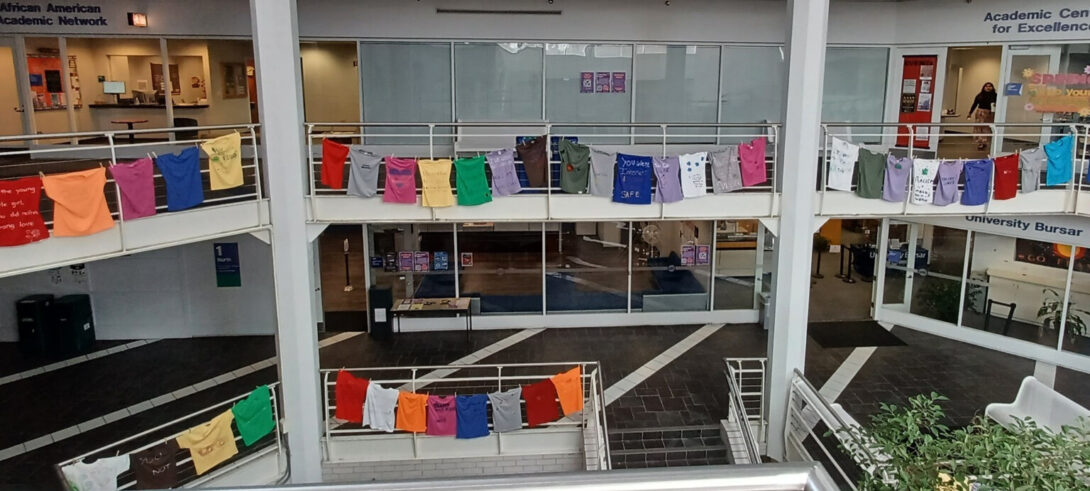
In the weeks leading up to Sexual Assault Awareness Month 2023, WLRC and CAN hosted a series of artmaking spaces to engage in conversations about gender-based violence and witness survivors’ stories of harm and healing. Students, staff, and faculty shared messages of trauma, resilience, and solidarity on the colorful t-shirts that formed our Clothesline Project exhibit and invited our community to center survivors and commit to ending gender-based violence at UIC.
Participants engaged deeply and thoughtfully, weaving together a picture of the multiple ways that trauma has touched our community as well as what safety and healing look like for us. We look forward to putting these commitments into practice together.
Thank you to the survivors who told their stories, the allies who bore witness and expressed support and solidarity, and our campus and community partners who made the project possible.
Spring 2023 Part 2
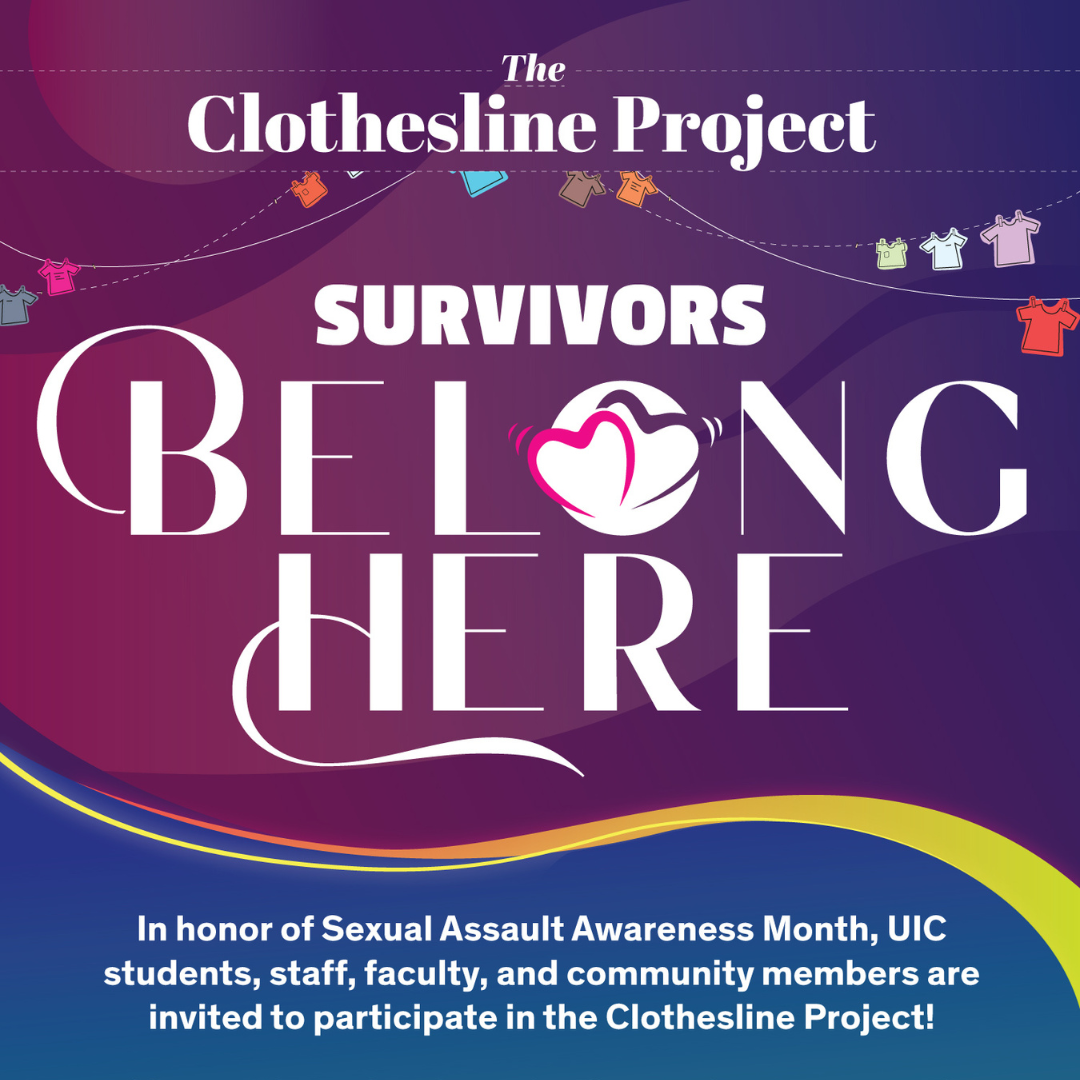
We are especially grateful to
- Our student team: Candice Gary, Susan Cisneros, Shiv Parekh, and Omar Limias Villa
- Our project leader: Jamey Arnold, former Education and Outreach Specialist
- Our student volunteers: Brooklyn Denman, Ishika Ashta, Mujeres en Medicina
- Our campus and community partners: Campus Housing, Women in Engineering Programs, Equity in Engineering Program, Asian American Resource and Cultural Center, African American Cultural Center, Commuter Center, Disability Cultural Center, Centers for Cultural Understanding and Social Change, SHAPE, SDAA, Apna Ghar, Greenlight Family Counseling, and Trans Chicago Empowerment Center
- Our speakers at the April 4 Survivors Speak Out event: Isaiah Abdullah, Sabrina Jones, and Jay Yencich.
View photos from all our events!
Reflections
We had a fantastic student team working with us on this year’s project. Here are their reflections on the experience:
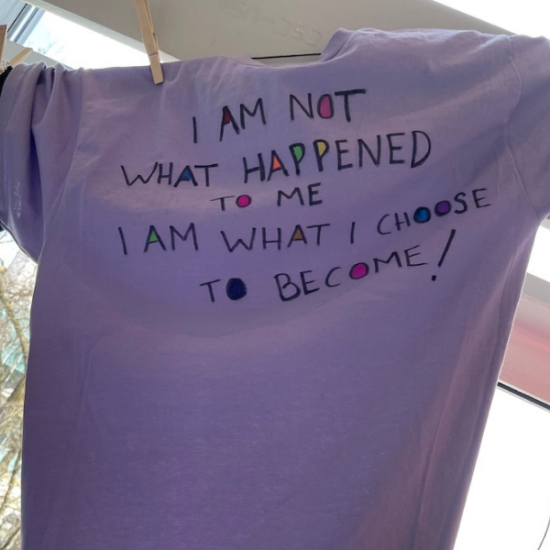
I dare to dream of a world of less violence, trauma, and grief. It starts with us collectively showing up, naming violence for what it is, and disrupting systems of oppression that perpetuate violence.
| Campus Advocacy Network Graduate Assistant
Candice Gary Reflection
[Pictured above is Candice’s favorite shirt. Black text on a purple t-shirt reads, “I am not what happened to me, I am what I choose to become!”]
Candice Gary
Being part of the Clothesline Project was a major highlight of the work I wanted to accomplish with my time with the Campus Advocacy Network and WLRC over the past two academic years. In 2021, I came across UIC Clothesline Project shirts from 2015 and knew that I wanted to see a revival while I was here. When I was an undergrad in rural Georgia (2010-2014), this project was meaningful to coordinate with my peers and for the campus community to witness and participate in conversations and actions about and against gender-based violence. In the fall of 2022, Jamey and I held brainstorming sessions on what we could imagine the Spring 2023 project might look like. I could not have envisioned that our ideas would become a massive network of collaborators from student-services and student-led units, sharing their experiences of hurt, survival, and growth. I am thankful for everyone who came along with us on this project.
Knowing that survivors and loved ones of those who are no longer here had a space carved out at UIC to honor their experiences is just one of many ways that we continue to rebel against narratives that violence is a rare phenomenon. I dare to dream of a world of less violence, trauma, and grief. It starts with us collectively showing up, naming violence for what it is, and disrupting systems of oppression that perpetuate violence.
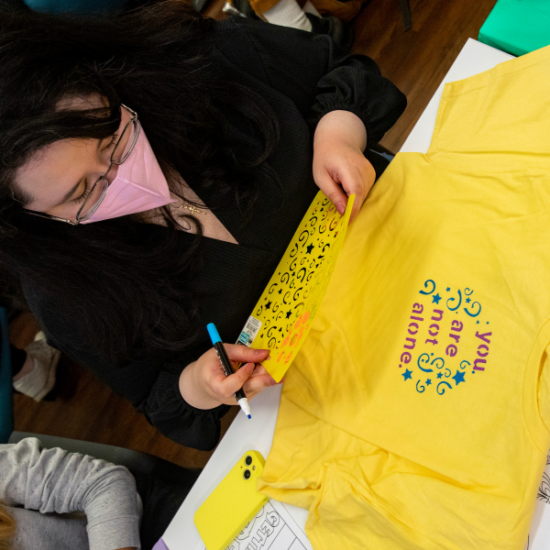
Sometimes all people need is a community to hear, believe, and care about them.
| Clothesline Project Intern
Susan Cisneros Reflection
[Pictured above is a Clothesline Project participant uses stencils to decorate a yellow T shirt with the text, “you are not alone” in purple surrounded by swirls of blue.]
Susan Cisneros
When first beginning the Clothesline Project, I had very little experience with art and healing for community based work. I am more familiar with using art as a form of healing in a private matter. It was very nice to see the reaction from members of the community around and in UIC. To watch as people began to process having such a healing experience has been such a learning experience. Sometimes all people need is a community to hear, believe, and care about them.
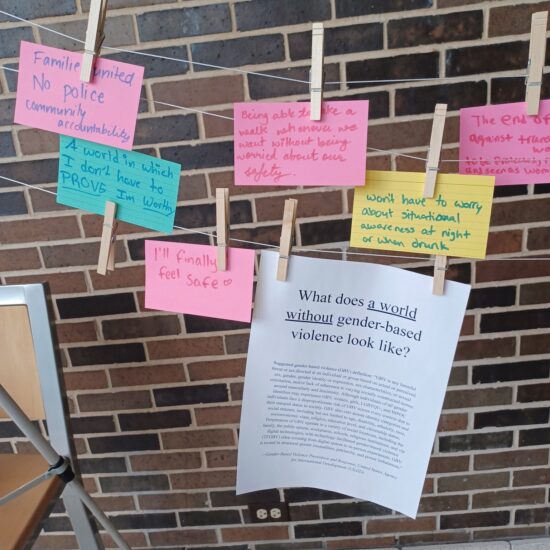
To commemorate the Clothesline Project at UIC, it meant ‘I’m seen.’
| Clothesline Project Intern
Omar Limias Villa Reflection
[Pictured above are written note cards hanging from a clothesline, part of the community writing activity Omar led at the Survivors Belong Here Clothesline Project exhibit. Also hanging from the clothesline is a sheet with the activity title: “What does a world without gender-based violence look like?”]
Omar Limias Villa
Being part of the Clothesline Project team at the Women’s Leadership Resource Center (WLRC) has been one of the most rewarding and gifting experiences. I hope folx were able to hone in their creativity and access their inner storytelling expressions during the duration of the events. These elements are foundational to gender-based violence work and allow folx to participate in interactive layers to large conceptual ideas.
Personally, I will be taking this experience with me to reframe and rethink about the ways I implement inclusive gender-based violence practice—forming decoding and decolonial mechanisms. I want to continue transforming spaces in this labor to welcome all bodies and create healing spaces for marginalized identities.
To commemorate the Clothesline Project at UIC, it meant “I’m seen.” I’m extremely grateful to have joined the planning phases to offer these events on campus. For me, executing the events and offering ideas in roundtable discussions with the team elevated this experience because part of this commemoration is also to practice collective care: “We do this for us, until we free us” (Mariame Kaba).
